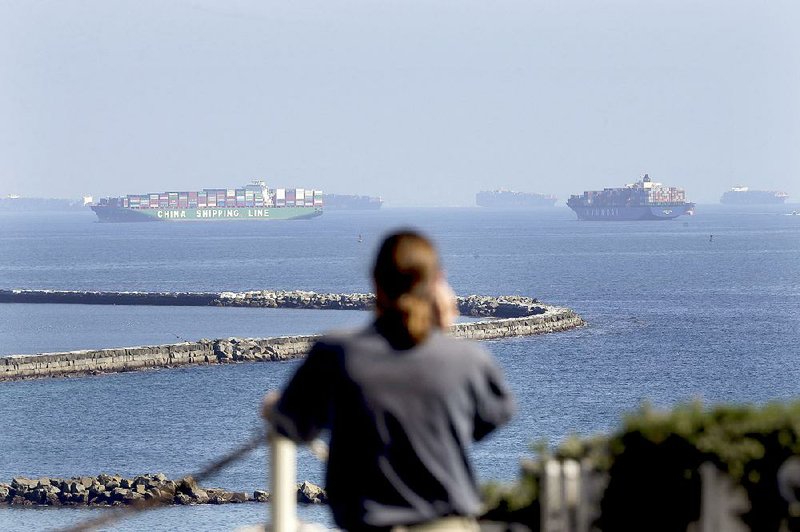LOS ANGELES -- Negotiators reached a tentative contract covering West Coast dockworkers Friday evening, likely ending a protracted labor dispute that snarled international trade at seaports handling about $1 trillion worth of cargo annually.
The breakthrough came after nine months of negotiations that turned contentious in the fall, when dockworkers and their employers began blaming each other for problems getting imports to consumers and exports overseas.
The five-year deal, confirmed by International Longshore and Warehouse Union spokesman Craig Merrilees, still must be approved by the 13,000-member union's rank and file. They work 29 ports from San Diego to Seattle that handle about one-quarter of all U.S. international trade, much of it with Asia.
Negotiators for the union and the Pacific Maritime Association, which represents oceangoing shipping lines and the companies that load and unload cargo at terminals ports, began talking formally in May. Their previous six-year contract expired July 1.
U.S. Secretary of Labor Thomas Perez said that both the dockworkers' union and their employers agreed to resume work this evening. "This is now in the rearview mirror," Perez said.
In recent weeks, employers cut most weekend work, saying they would not pay extra wages.
"We are pleased to have reached an agreement that is good for workers and for the industry," said maritime association President James McKenna and union President Bob McEllrath in a joint statement. "We are also pleased that our ports can now resume full operations."
Negotiators for the two sides were seen shaking hands and hugging in the the Pacific Maritime Association headquarters shortly after 6 p.m. Los Angeles time, just as word of a deal leaked out.
After initial signs of progress, employers in the fall publicly accused dockworkers of creating a congestion crisis to gain bargaining leverage by slowing their work rate and withholding the most skilled workers. The union responded that its members were working safely and blamed the jam on broader dysfunction at West Coast ports that predated contract talks, notably a lack of truck beds to tow containers from dockside yards to distribution warehouses.
By January, the maritime association's members stopped ordering night work crews to load and unload ships, saying that smaller groups would focus on clearing the thicket of containers already on the docks. Union members called it an attempt to hurt workers in their pocketbooks; their negotiators soon agreed to the involvement of a federal mediator.
In early February, the CEO of the maritime association publicly warned that if no agreement could be reached, employers would stop calling workers and shut down the ports within days. Weekend and holiday lockouts of many longshoremen followed, although major ports were not fully closed.
Instead, cargo trickled through. Massive ships anchored off the coast of Los Angeles and near the ports of Oakland and Seattle -- waiting for berths they anticipated occupying after the long haul across the Pacific that instead were taken by ships whose unloading was itself far behind schedule. By mid-February, about 30 ships clustered outside the Los Angeles and Long Beach harbors, with similar scenes in San Francisco Bay and Washington's Puget Sound.
After a federal mediator couldn't broker an agreement, President Barack Obama's administration dispatched Perez to oversee talks this week in San Francisco, where both the union and maritime association are based. After a few days, he warned negotiators that if they didn't seal a deal by midnight Friday, he'd haul them back to Washington, where a parade of elected leaders had been imploring resolution.
The disagreement boiled down to the system for resolving allegations of work slowdowns, discrimination and other conflicts at the ports. The union wanted to get rid of the man who arbitrates disputes in Southern California and proposed changes to the arbitration systems that would accomplish that; the maritime association rejected those suggestions -- though eventually the two sides found a compromise.
Details of how that dispute was resolved were not immediately available.
Information for this article was contributed by James Nash and Alison Vekshin of Bloomberg News.
Business on 02/21/2015
